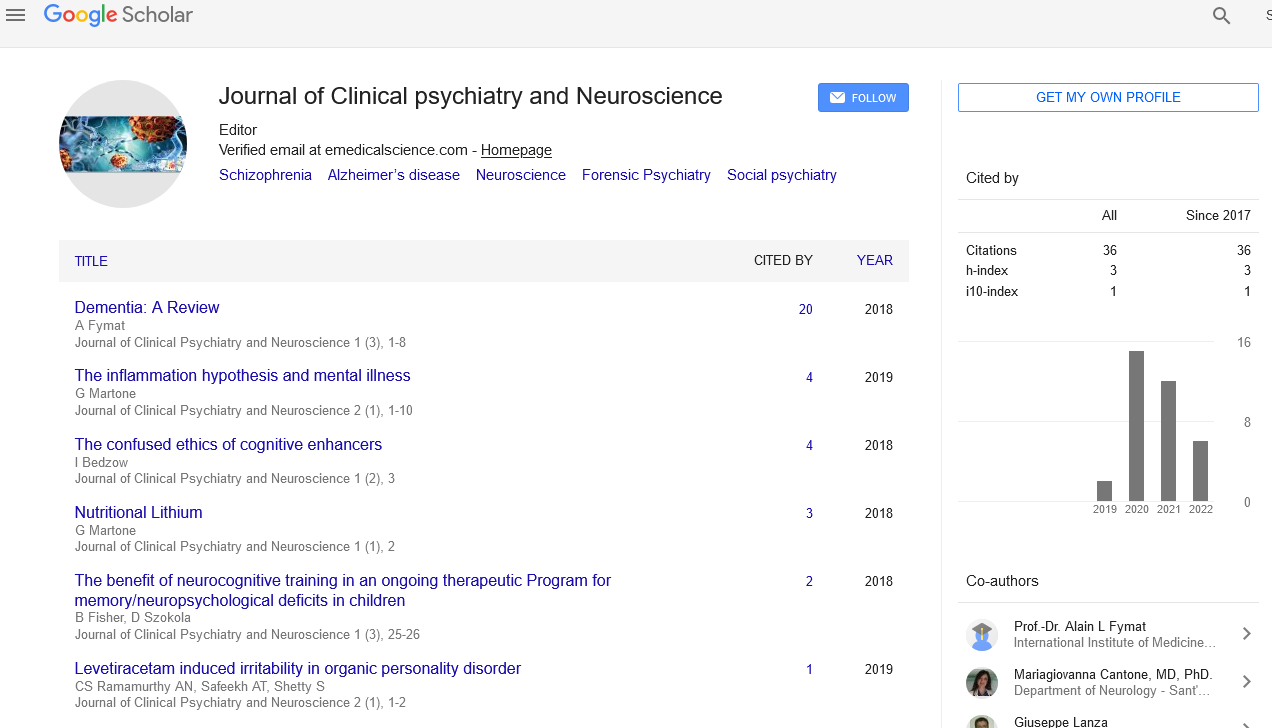Examining a mechanism for the control of neuroinflammation via mindful music listening
Received: 07-May-2023, Manuscript No. puljcpn-23-6584; Editor assigned: 09-May-2023, Pre QC No. puljcpn-23-6584 (PQ); Accepted Date: May 26, 2023; Reviewed: 10-May-2023 QC No. puljcpn-23-6584 (Q); Revised: 11-May-2023, Manuscript No. puljcpn-23-6584 (R); Published: 27-May-2023, DOI: 10.37532/puljcpn.2023.6(3).108-09
Citation: Tsitati G. Examining a mechanism for the control of neuroinflammation via mindful music listening. Clin Psychiatry Neurosci. 2023; 6(3):108-09.
This open-access article is distributed under the terms of the Creative Commons Attribution Non-Commercial License (CC BY-NC) (http://creativecommons.org/licenses/by-nc/4.0/), which permits reuse, distribution and reproduction of the article, provided that the original work is properly cited and the reuse is restricted to noncommercial purposes. For commercial reuse, contact reprints@pulsus.com
Abstract
Millions of ageing persons worldwide are afflicted by the neurological ailment known as Alzheimer's Disease (AD). In fact, according to recent data, the number of AD patients globally is expected to quadruple by 2050. As a result, the toll that AD takes on people, families, and society at large is swiftly increasing, highlighting the increasing need for cutting-edge treatments to halt the disease's course and enhance the lives of AD patients. Lifestyle interventions may be particularly well-positioned to assist those with AD and other forms of dementia, such as Mild Cognitive Impairment (MCI), as they offer a more sustainable change through motivated behavior, while also being relatively cost-effective and feasible to implement. Pharmacological treatments, however, remain a current area of research and an important component of many individuals' care.
Key Words
Music; Intervention; Neuroinflammation; Immune
Introduction
Alzheimer's Disease (AD) is characterized by psychological symptoms like depression and a lack of motivation as well as cognitive symptoms like memory loss and trouble with tasks requiring executive function. As knowledge about the root causes of AD has grown, notably with the use of diagnostic biomarkers like amyloid and tau, AD and related disorders have evolved to be seen as a spectrum of diseases, with severe dementia just representing one end of the spectrum. A person with biomarkers for AD may initially exhibit no signs or symptoms before progressing over the course of 15 to 25 years to a condition of dementia. This shows how protein buildup, neurodegeneration, and the subjective perception of dementia symptoms interact in a complex way.
The pathophysiology of AD is characterized by the buildup of aggregated proteins like amyloid. These proteins cause the inflammatory response, which in turn stimulates glial cells, including microglia and astrocytes, in the central nervous system. Inflammation, which further promotes protein aggregation, contributes to the cyclic nature of this activation. For instance, ASC specks that are released by microglia bind to amyloid and promote the formation of amyloid aggregates. This process helps AD spread throughout the brain by causing local inflammation to be triggered by protein accumulation, which in turn causes further protein accumulation, and so on. Areas of inflammation are produced by the release of pro-inflammatory chemicals and cytokines by activated astrocytes and microglia, including TNF-, IL-1, and inducible nitric oxide synthase.
There is currently no one explanation that explains all of the clinical and pathological manifestations of AD, despite the fact that amyloid and tau have long been of interest in AD research. There is a lot of debate in the field on whether amyloid is the main cause of impairments in AD. Immune dysregulation has gained a lot of attention as a potential alternative to the amyloid hypothesis. Inflammation is believed by recent studies on gene regulatory networks to be the primary cause of late-onset AD in mice models. In mouse and worm models of AD, the production of amyloid in response to bacteria can be neuroprotective. This suggests that inflammation may not just be a secondary consequence of misfolded and aggregated proteins, but may also be a major contribution to ADrelated impairments.
Understanding the function of Nuclear Factor Kappa Beta (NF-B) is also essential for investigating the connection between AD and neuroinflammation. NF-B is a transcription factor that regulates a gene network intimately associated with immune regulation. NF-B remains in the cytoplasm linked to inhibitory proteins when it is not activated. Both canonical and non-canonical NF-B activation pathways are critical for the control of immunity. The non-canonical mechanism relies on processing of the p100 proteins, whereas the conventional approach predominantly includes activation via induced degradation of I-B (a key NF-B inhibitory protein). The canonical route often plays a major role in both innate and adaptive immune responses. The acquired immune system is frequently regulated by non-canonical pathways, which function in conjunction with canonical activation. Both pathways influence how NF-B functions.
We suggest that persons with AD and other dementia-related illnesses may be able to control neuroinflammation with the help of musicbased therapies. Listening to music activates the reward system and causes the relaxation response, which can have a favorable impact on mood by reducing stress and depressive symptoms. Music may be able to modulate NF-B dependent gene networks through these moodbased alterations, hence reducing levels of neuroinflammation. This pathway offers a mechanism by which mindful music-listening may sustainably lead to reduced stress and other positive mood effects in people with Alzheimer's Disease without depending on pharmacological intervention, increasing quality of life, lowering AD care costs, and easing the burdens on families and careers of those with dementia.
A significant improvement in the quality of research on the relationship between music and dementia would be to pursue studies into the biomarkers of inflammation, stress, and AD to clarify the impacts of MBI. This could make substantial progress towards the objective of discovering novel strategies to enhance cognitive function in both healthy ageing and AD patients.





